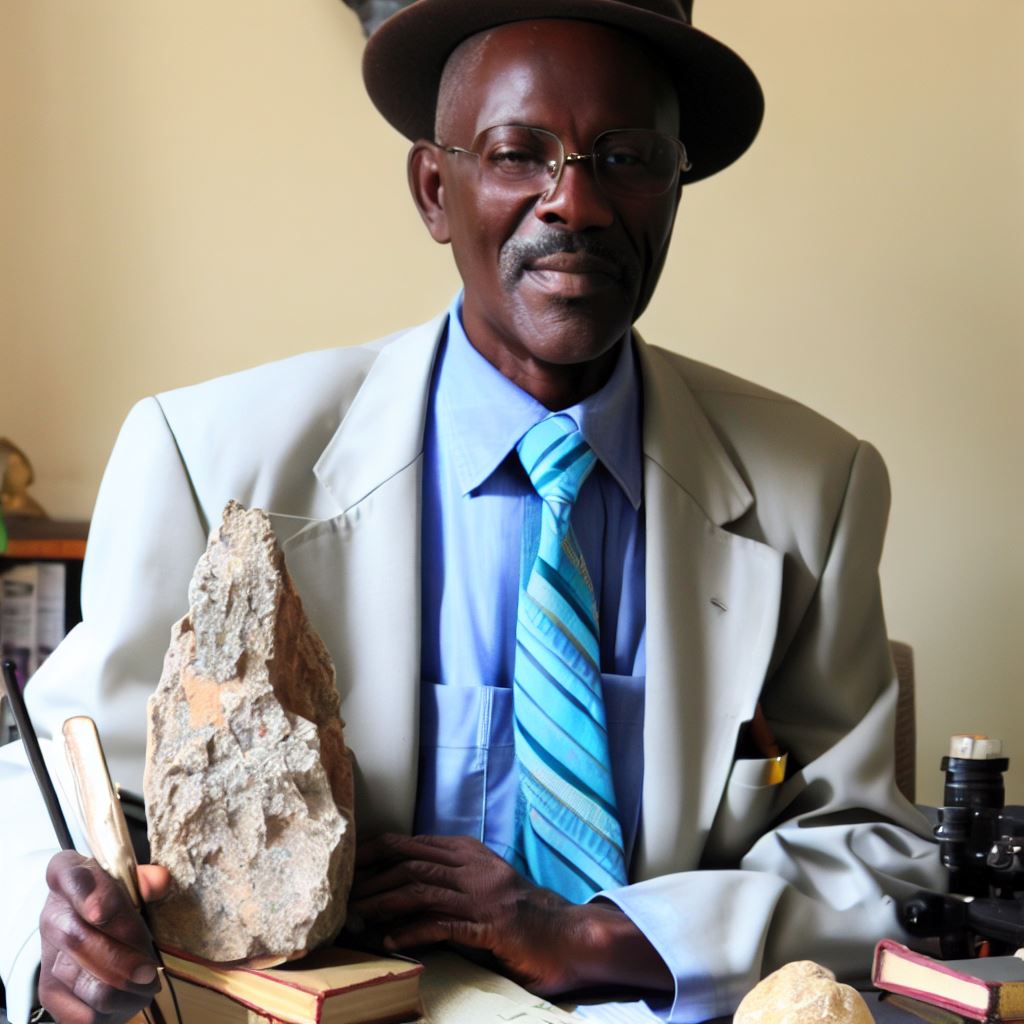Introduction
These innovations enhance data collection, analysis, and visualization, improving our understanding of Earth’s processes.
Geologists now employ advanced remote sensing techniques, like LiDAR and satellite imaging, to study terrain and geological features.
Active seismic surveys enable real-time monitoring of subsurface changes, aiding in earthquake prediction and resource exploration.
Ground-penetrating radar assists in mapping subsurface structures, enhancing our knowledge of geological formations.
An overview of the geological landscape in Nigeria
The geological landscape of Nigeria is characterized by diverse features, shaped by various geological processes over time.
Nigeria’s geological makeup results from tectonic movements, volcanic activities, and sedimentary deposition.
Active fault lines crisscross the country, causing occasional seismic events.
Volcanic activity is evident in places like Jos Plateau, with ancient lava flows and volcanic rocks.
Sedimentary rocks, rich in fossils and minerals, form extensive layers across the nation.
The Niger Delta region features a unique deltaic environment, shaped by the Niger and Benue Rivers.
The North Central region boasts granitic rocks and Precambrian formations.
The Obudu Plateau showcases folded mountain ranges, offering stunning views and diverse flora and fauna. Nigeria’s northern region hosts vast desert expanses like the Sahel.
The current trends in using technology in geology in Nigeria
The current trends in using technology in geology in Nigeria” are characterized by a dynamic landscape of advancements and applications.
Geologists across Nigeria have actively embraced cutting-edge technology to enhance their exploration, analysis, and management of geological resources.
One prominent trend is the utilization of remote sensing technology.
Geologists employ satellite imagery and aerial photography to efficiently map and study geological features.
This active engagement with remote sensing aids in identifying potential mineral deposits, monitoring geological hazards, and assessing environmental impacts.
Geographic Information Systems (GIS) play a pivotal role in geological research and exploration.
Geologists actively integrate GIS for mapping, modeling, and data analysis.
This active approach allows for better decision-making in areas such as mineral resource management, land-use planning, and environmental conservation.
Nigeria’s geological landscape presents both challenges and opportunities for the use of technology in geology.
From remote sensing techniques to GIS software and drilling advancements, technology has revolutionized the field while enabling geologists to better understand and utilize the nation’s resources.
As the technology continues to advance, the future of geology in Nigeria holds immense potential for further growth and development.
Importance of Technology in Geology
Explain the essential role of technology in modern geology
- Technology is crucial in modern geology as it enables scientists to gather and analyze vast amounts of data.
- Through advanced tools and equipment, geologists can accurately study geological formations and processes.
- Technology facilitates remote sensing, mapping, and monitoring of geological phenomena across large areas.
How technological advancements have revolutionised the field
- Technological advancements have led to the development of sophisticated imaging techniques like LiDAR and satellite imagery.
- These innovations allow for detailed and high-resolution mapping of geological features and subsurface structures.
- Remote sensing technologies provide geologists with valuable information about Earth’s surface and subsurface.
- With the help of computers and software, geologists can model complex geological processes and simulate scenarios.
The benefits of using technology in geology in terms of accuracy, efficiency, and cost-effectiveness
- Technology enhances accuracy in data collection, analysis, and interpretation, reducing errors and improving reliability.
- Efficiency is increased as technology enables geologists to process and analyze data much faster than manual methods.
- By automating certain tasks, technology frees up time for geologists to focus on data interpretation and problem-solving.
- The use of technology also eliminates the need for tedious manual measurements, saving time and reducing labor costs.
- Advanced software and equipment help geologists make informed decisions, reducing the risk of costly mistakes in exploration and resource management.
Technology plays a vital role in modern geology by providing essential tools and techniques for data collection, analysis, and interpretation.
Technological advancements have revolutionized the field, enabling detailed mapping, remote sensing, and simulation of geological processes.
Using technology in geology offers numerous benefits, including increased accuracy, efficiency, and cost-effectiveness.
Embracing and leveraging technology is essential for geologists to make informed decisions and drive innovation in the field.
Read: Biochemistry in Nigeria: Job Opportunities
Overview of Geology in Nigeria
Brief history of geological research in Nigeria
- Nigeria has a rich history of geological research dating back many years.
- Early explorers documented the country’s geology, contributing to the understanding of its geological features.
- Foreign geologists also played a significant role in studying Nigeria’s geology and mapping its resources.
- In the 20th century, the Nigerian Geological Survey Agency was established to further research and exploration.
- Today, geologists continue to study and analyze the geological formations in Nigeria.
- Research efforts have led to the discovery of valuable mineral resources and contributed to economic development.
- The history of geological research in Nigeria is essential for understanding the country’s geology and its potential.
Unique geological features of Nigeria
- Nigeria’s diverse landscape is characterized by various geological features.
- The country is home to extensive sedimentary basins, which hold significant oil and gas reserves.
- Plateaus, such as the Jos Plateau in central Nigeria, are notable features.
- The presence of volcanic regions, such as the Jos-Biu-Mambilla Plateau, showcases Nigeria’s geologic diversity.
- The Niger Delta region, with its vast mangrove swamps and river channels, is of great geological interest.
- Nigeria is also known for its rich mineral resources, including gold, limestone, tin, and coal.
- These resources have fueled economic activities and contributed to the country’s development.
- However, Nigeria is not without natural hazards, including earthquakes, landslides, and erosion.
- Understanding and monitoring these hazards is crucial for ensuring the safety and well-being of the population.
Geology in Nigeria has a fascinating history and offers unique geological features.
The country’s diverse landscape, sedimentary basins, plateaus, volcanic regions, mineral resources, and natural hazards make it an exciting field of study.
Geologists in Nigeria continue to contribute to research, exploration, and economic development.
The understanding of Nigeria’s geology is crucial for sustainable development and managing potential natural hazards.
Read: A Day in the Life of a Nigerian Librarian: Insights
Current Technological Trends in Geology in Nigeria
Remote Sensing and GIS Applications
Remote sensing, particularly through the use of satellite imagery, has become an indispensable tool in geological mapping and monitoring in Nigeria.
The availability of high-resolution imagery allows geologists to analyze large areas and identify geological formations with precision.
Additionally, the integration of Geographical Information Systems (GIS) has enhanced spatial analysis and data management in geological research.
GIS enables geologists to overlay different datasets, perform spatial analyses, and gain valuable insights into geological phenomena.
Ground Penetrating Radar (GPR) and Seismic Surveys
Ground Penetrating Radar (GPR) is a non-destructive geophysical method that uses electromagnetic waves to produce images of subsurface structures.
In Nigeria, GPR has found extensive applications in subsurface imaging and investigation. It helps geologists to detect buried objects, identify geological layers, and assess soil conditions.
Similarly, seismic surveys play a crucial role in understanding geological structures and facilitating hydrocarbon exploration.
By analyzing seismic waves generated by controlled sources, geologists can map subsurface rock layers and identify potential oil and gas reservoirs.
Geochemical Analysis Techniques
Geochemical analysis techniques, such as X-ray fluorescence (XRF), X-ray diffraction (XRD), and other spectroscopic methods, have revolutionized mineral exploration in Nigeria.
These techniques allow geologists to analyze the chemical composition and structure of minerals.
By understanding the geochemical characteristics of rocks, geologists can identify potential mineral deposits and determine their economic viability.
Accurate geochemical data is essential for making informed decisions in geological investigations and resource exploration.
Geophysical Methods
Geophysical methods, including electromagnetic and gravity surveys, have become invaluable tools in geology.
Electromagnetic surveys measure variations in the Earth’s electromagnetic field to identify subsurface geological structures.
Gravity surveys, on the other hand, measure gravitational anomalies caused by variations in subsurface density.
These methods aid in mapping subsurface structures, identifying potential hazards, and predicting geological phenomena like earthquakes and landslides.
By combining different geophysical techniques, geologists can develop comprehensive models of the subsurface and assess potential risks.
By leveraging technological advancements in geology, Nigeria has seen significant progress in the field.
This blog section will explore the current trends in using technology for geological research and applications within the country.
The utilization of technology in geology has brought about significant advancements in Nigeria.
Remote sensing and GIS applications enable accurate mapping and analysis of geological formations.
Ground Penetrating Radar and seismic surveys facilitate subsurface imaging and hydrocarbon exploration.
Geochemical analysis techniques provide crucial data for mineral exploration and resource assessment.
Geophysical methods aid in mapping subsurface structures and predicting geohazards.
With the continual development of technology, Nigeria’s geologists are well-equipped to make important discoveries and contribute to the understanding of the country’s geological landscape.
Read: The Future of Geology Profession in Nigeria: A Forecast

Challenges and Limitations
Addressing the potential drawbacks of relying solely on technology in geology
- Dependency on technology may lead to a lack of critical thinking skills.
- False readings or inaccuracies can occur if equipment is faulty or improperly calibrated.
- Interpretation of data may be subjective and influenced by personal biases.
- Technology may have limitations in detecting certain geological phenomena or processes.
- Overreliance on technology may result in a disregard for traditional fieldwork skills.
The need for human expertise and fieldwork in conjunction with technology
- Human expertise provides crucial context and interpretation of geological data.
- Fieldwork allows geologists to observe geological features and collect samples for analysis.
- Direct observation helps identify subtle changes that technology may overlook.
- Fieldwork fosters a deeper understanding of the geological environment and processes.
- Integrating technology with human expertise maximizes the accuracy and reliability of geological studies.
Challenges specific to Nigeria, such as limited access to technology and infrastructure
- Nigeria faces significant disparities in access to technology among different regions.
- Rural areas often lack necessary infrastructure for utilizing advanced geological technology.
- High costs of technology and limited funding pose barriers for geological research in Nigeria.
- Inadequate training and education on using technology hinder its effective implementation in geology.
- Nigeria needs to invest in improving technology infrastructure and providing relevant training opportunities.
While technology plays a crucial role in modern geology, solely relying on it poses potential drawbacks.
Geologists must recognize the limitations of technology and complement it with human expertise and fieldwork.
In Nigeria, limited access to technology and infrastructure creates additional challenges, requiring investments in both resources and training.
By finding a balance between technology and fieldwork, geologists in Nigeria can overcome these challenges and enhance their understanding of the country’s geology.
Read: Women in Geology: A Focus on the Profession in Nigeria
Future Prospects and Conclusion
We will discuss the potential advancements and emerging technologies in geology for Nigeria.
The potential advancements and emerging technologies in geology for Nigeria
Advancements in technology have significantly impacted the field of geology, and Nigeria is no exception.
With the increasing availability and affordability of advanced tools and techniques, the future prospects in geology are promising.
The importance of continued investment in technological infrastructure and research
One of the emerging technologies in geology is remote sensing, which allows for the collection of data through satellites and aircraft.
This technology provides valuable information about the Earth’s surface, including geological features and resources.
The significance of incorporating technology with traditional geological approaches for comprehensive understanding
Another potential advancement is the use of Geographic Information Systems (GIS) in geological studies.
GIS enables the integration and analysis of various geospatial data, enhancing our understanding of geological processes and improving resource exploration and management.
Investment in technological infrastructure and research is crucial for the advancement of geology in Nigeria.
Providing researchers and professionals with state-of-the-art equipment and software will facilitate better data collection, analysis, and interpretation.
Furthermore, continued investment in research and development will drive innovation in geology, leading to new technologies and methodologies that can address Nigeria’s specific geological challenges.
Incorporating technology with traditional geological approaches is of great significance.
While technology provides efficient and accurate data, it should complement rather than replace fieldwork and manual observations.
This integration ensures a comprehensive understanding of geological phenomena, combining the strengths of advanced technologies with the expertise of geologists on the ground.
The future of geology in Nigeria holds immense potential due to advancements in technology.
Continued investment in technological infrastructure and research is essential, as is the integration of technology with traditional approaches for a holistic understanding of the country’s geological landscape.
Conclusion
Technology is revolutionising geology in Nigeria. Advanced tools like GIS and remote sensing empower geologists, improving accuracy in mapping and resource exploration.
Additionally, real-time data from monitoring systems enhances hazard prediction and management.
The integration of artificial intelligence streamlines data analysis, making geological studies more efficient and insightful.
With the growth of 3D modelling and virtual reality, geologists can explore subsurface structures and visualise geological phenomena like never before.
Moreover, the accessibility of geological information through online platforms fosters collaboration and knowledge-sharing among experts.
This technology-driven approach not only accelerates geological research but also plays a crucial role in sustainable resource management.
As Nigeria continues to embrace these technological trends, the future of geology in the country holds promise for more accurate assessments, better resource utilisation, and enhanced environmental protection.
Embracing technology is not just an option; it’s a necessity for the advancement of geological sciences in Nigeria.




